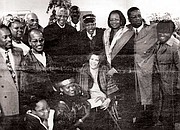ML woman shares connection with Mandela
MOSES LAKE - Without her, it would not be done. That is what Maryamu Givens, now a Moses Lake substitute teacher, said about the release and memorial of Nelson "Madiba" Mandela.
She had been on her way to the store Dec. 5 to buy marshmallows and hot chocolate for the Harambee Children's Theater group. She turned on the radio and barely believed it; her friends in the loop had told her he was getting better, not worse. Nelson Mandela died.
Givens cried, she said, but was comforted by the thought, "I am doing something he would have enjoyed."
After years of fighting together although far apart, Givens still measures the importance of her work against Mandela's passions.
"Mandela loved children," Givens said.
Givens spent most of the 1980s and the first part of the 90s working with the global anti-apartheid campaign, which protested against South African governments including Zambia, Zimbabwe and South Africa, she said. In these countries, people were cast by race and privileges were given to white and other races deemed superior by authorities there.
She said after reading the writing of Martin Luther King, Gandhi and Stokely Carmichael in the late 1970s and early 80s she decided, "I'm standing up."
Vietnam was over, she said, "This was the next cause."
In the beginning, she said the movement focused on getting black, colored and Indian citizens of South Africa the right to vote. She said Mandela became a symbol of the struggle, "He was a man with the most to lose and most to gain."
Givens was an important part of the anti-apartheid movement, working with several activist groups in Seattle and several religious organizations, and represented them across the country. Newspaper articles from The Seattle Times feature Givens' work as a teacher and an activist.
She was one of the few black women who were active and outspoken in the Northwest regarding apartheid in South Africa, she said. About 95 percent of those active in the movement were white.
She said Eastern Washington had several representatives in the Coalition against Apartheid, as well, including Moses Lake, Yakima and Spokane.
Givens was the co-chair of the Coalition Against Apartheid representing the Pacific Northwest and Seattle for several years until it became inactive soon after Mandela was released from prison in 1990, she said.
Givens met Mandela for the first time the same year of his release in Oakland, Calif.. She later met the man as President Mandela in Seattle, where 25 of her students from First Place, a school for students in transitional living situations were allowed to see him talk, as well.
"When I saw him, I saw his non-anger. Saw his reconciliation. For black and white it was time to come together," Givens said.
"When you meet Mandela, you are surprised at how thin and frail he is. But tall. And thoughtful. He wanted to thank every activist in Seattle, very friendly."
"A deliverance type of person. When he said we were gonna learn to live together, you believed him," she said. At first, the transition out of anger was hard for her, "I was so angry," she said.
Now, many years later, the progress in South Africa continues, where there is still poverty, youth violence and high unemployment, Givens said.
Givens came to Moses Lake mainly out of sorrow, she said, after loosing her daughter, Zena Swindle, in 2010. She said it took a while for the community to get used to her, but she likes it here.
She wants the community to know that someone here had a connection with Mandela.
She is it.





